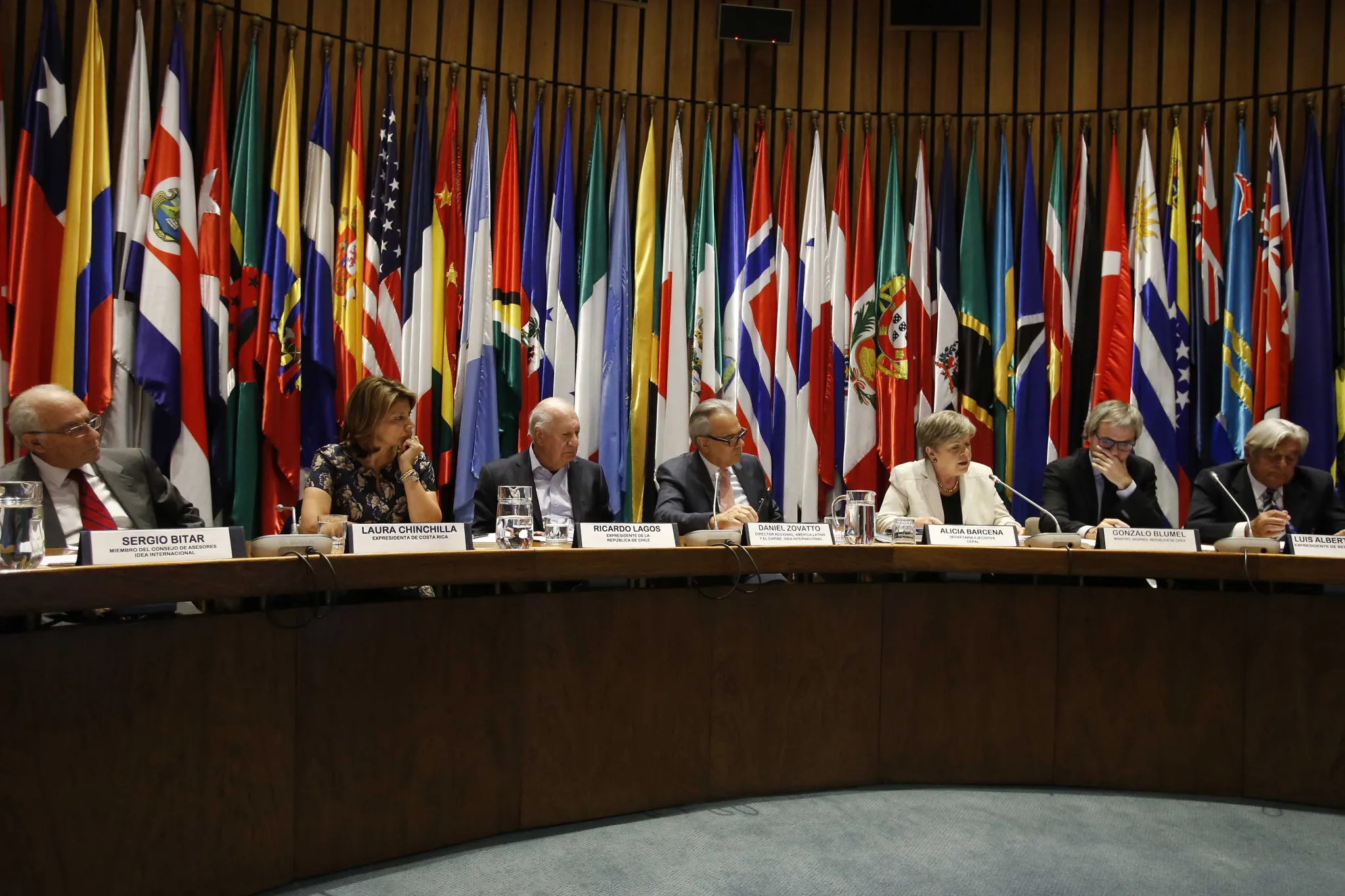International IDEA and ECLAC bring together politicians and intellectuals to analyze the state of democracy in Latin America

International IDEA and ECLAC jointly organized the Regional Conference on the "State of Democracy in Latin America" in Santiago, Chile, on 26-28 November 2018.
Este artículo se encuentra disponible en Español.
The Conference was inaugurated on Monday, 26 November, at the ECLAC headquarters in Santiago, Chile by the Regional Director of International IDEA, Daniel Zovatto and by the Executive Secretary of ECLAC, Alicia Bárcena. Dr Zovatto then moderated the inaugural panel that was composed of former presidents Laura Chinchilla (Costa Rica), Luis Alberto Lacalle (Uruguay) and Ricardo Lagos (Chile), as well as the Minister of the General Secretariat of the Presidency (SEGPRES), Gonzalo Blumel, and the member of the International IDEA Advisory Board, Sergio Bitar, who analyzed the state of democracy in Latin America, 40 years since the beginning of the Third Democratic Wave in the Region.
During his presentation, the Regional Director of International IDEA highlighted that an analysis of the reality of Latin America shows that there are both reasons for hope and frustration, reason to see the glass half full but also to see it half empty. However, he warned, the data from the opinion poll Latinobarómetro 2018, warn us that democracy is going through its mid-life crisis. The level of support lost 5 points and stands at 48 per cent, the worst indicator since the 2001 crisis. The percentage of indifference (between democratic and authoritarian systems) climbed from 16 per cent to 28 per cent, especially among young people aged 16 to 26 years, which is serious because of its potential future consequences. On the other hand, dissatisfaction with democracy went from 51 per cent to 71 per cent, while satisfaction fell sharply from 44 per cent to 24 per cent.
According to Zovatto, "there are two main reasons to explain citizen dissatisfaction and frustration with democracy: the structural ones and the lack of results. The first is related to the transition from one type of society to another with institutions that do not respond and the second has to do with the desire for results and effectiveness of governments and not with a desire for more authoritarianism."
And in the face of this complex regional picture, the Director of International IDEA proposed to set in motion a renewed agenda aimed at restoring public confidence in politics, its elites and institutions, modernizing the development model and redefining the social contract. He also proposed expanding the spaces for citizen participation and ensuring effective citizenship, with the aim of strengthening governance, improving the quality of public policies and laying the foundations for a new generation of democracy, inclusive, prosperous and, above all, resilient, that is, with the capacity to face crises and complex challenges, survive, innovate and recover.
Alicia Bárcena, on her part, highlighted that "the great inequality in Latin America affects the quality of our democracy. When a privileged few have access to the State, they defend minority interests." Sergio Bitar, who introduced the topic, analyzed the problems of governance and the role of values, noting that "the challenge for politics is to do it with increasing uncertainty. When we are in a scenario of uncertainty, nothing replaces values as means of political action".
During his intervention in the inaugural panel, the ex- president Ricardo Lagos emphasized that "the current global problems force us to think about the type of social contract that we need. One needs to have a long-term view and not just thinking about the next election." Former President Laura Chinchilla stressed institutional aspects in the face of citizen discontent with democracy, "there is a depletion of representative political institutions, these are the most discredited in society. The parties act as franchises to represent corporate interests and executives do not achieve majorities. We must move towards presidential coalitions." Finally, former President Luis Alberto Lacalle stressed the need for governments to be effective in overcoming the problems of democracy "we are a society over diagnosed, what we need is to govern effectively; Comply with what was promised and leave our countries better than we received it. This can only be done with strengthened and re-legitimized parties." Finally, Minister Gonzalo Blumel stressed that currently "democracy is more threatened by endogenous than exogenous factors. It is no longer autocracies that threaten us but problems of democracy itself, such as corruption or the discomfort of the middle classes."
On 27 and 28 November, panels were held around various important topics with participants with expansive political and academic career. On Tuesday the 27th, the political and socio-economic context of Latin America, the ongoing electoral super cycle in the region as well as the impact of social networks and "Fake news" on politics, elections and democracy were analyzed.
On Wednesday 28th, three panels were organized on the expectations and growing agenda of the middle class, analysis of the situation of the Rule of Law in Latin America and the future of democratic politics and governability. With this last panel the activities carried out together with ECLAC were concluded.
The same Wednesday, on 28 November, International IDEA organized at the headquarters of the Latin American Faculty of Social Sciences (FLACSO) a panel which analyzed the current situation and challenges in five countries of the region, with a focus on Cuba, Venezuela, Nicaragua, Honduras and Colombia. Participants included: Rosa María Payá (Cuban political activist), Luis Vicente León (Dataanálisis Venezuela) and Tomás Guanipa (Assembly Member of Venezuela), Edmundo Jarquín (former presidential candidate of Nicaragua), Miguel Cálix (political analyst of Honduras), Andrés Molano (Advisor to the Ministry of Foreign Affairs of the Republic of Colombia), and former President of Uruguay, Luis Alberto Lacalle.
The recording of the Inaugural Panel is available here.
More photos from the Inaugural Panel are available here.



